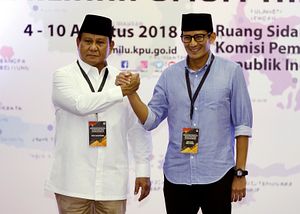Last week, Sandiaga Salahuddin Uno, the vice governor of Jakarta, was officially chosen as the running mate for Prabowo Subianto, one of the candidates in the 2019 presidential election. The decision was made public on August 9.
Uno’s acceptance of the appointment means that he has to leave his current position as the vice governor under Anies Baswedan, who was sworn in less than a year ago, on October 16, 2017. This is similar to when the current President Joko Widodo, left his position as Jakarta’s governor to run for president in 2014.
While most debates in the media are concentrating on issues relating to the 2019 elections — such as why Subianto chose Uno or whether Uno will give a boost to Subianto’s electability, one should also ask about the implication of Uno’s decision on Jakarta, a capital city which has now been left by top leaders twice. Particularly, for Jakarta, the questions are who will replace Uno, and what will become of the various promises that Baswedan and Uno made during the campaign.
Replacing the governor and/or vice governor is under the full authority of Jakarta’s Regional People Representative Assembly (DPRD DKI). In the past few days, a few names have been proposed as Uno’s potential replacements, including Muhammad Taufik, vice chairman of DPRD Jakarta; Ahmad Heryawan, former governor of West Java; and Mardani Ali Sera, chairman of the Central Executive Board of the Prosperous Justice Party (PKS).
A Potential Dilemma for Baswedan
Uno’s decision could have implications for the continuation of Baswedan’s tenure in Jakarta. Uno is a businessman who has a unique approach to solving various problems in the capital. None of the names floated as potential replacements has a business background like Uno.
Meanwhile, Uno is the mastermind behind some of Baswedan’s major initiatives, such as OK-OC, One Kecamatan One Center (One Sub-District, One Center), 0 percent down-payment residential housing, clean water networks, and the Persija (Jakarta’s biggest football club) stadium, which is expected to be completed in 18 months. There initiatives remain at an incipient stage and are far from completion. Baswedan might have difficulties in continuing Uno’s initiatives because his approach tends to be bureaucratic and conceptual in implementing his policies and in dealing with a variety of Jakarta’s problems.
Baswedan and Uno are believed to be an appropriate pair who complement each other, and Uno’s loss might affect the performance of Jakarta’s government. Uno has contributed a lot to solving the air quality problem in Jakarta by creating a program that supports the use of gas as a vehicle fuel, as well as solving the issue of the prostitution center, Alexis, with his OKE-OCE movement, which he initiated before taking office. With Uno’s departure, Jakarta is losing a leader who can provide quick and appropriate solutions to the vital problems in the city.
This should be taken into consideration especially because Jakarta is hosting the Asian Games (alongside Palembang) from August 18 to September 2 and the 2018 Asian Para Games, which will be held from October 8 to 16. With only one person left in the city’s top leadership at the moment, Baswedan’s administration will surely be tested.
The Next Step
With this in mind, Uno’s party must provide potential replacements who are equally (or more) capable so that they can work with Baswedan to bring the Indonesian capital forward.
The new vice governor appointment must also be done quickly, considering that there are two major agendas in Jakarta.
First, the new vice governor must be able to fulfill the campaign promises that have been made by Baswedan and Uno.
Second, the problem of corruption must also be taken into consideration. It is crucial to note that one of the candidates to replace Uno, Muhammad Taufik, was previously convicted of corruption after causing state losses of 488 million Indonesian rupiahs in the procurement process for the 2004 election, when he served as the chairman of the General Elections Commission (KPU). Taufik was sentenced to 18 months in prison in 2004. His name was again in the news after he criticized KPU’s regulation No. 20 of 2018, prohibiting those who have been convicted of corruption from running in the 2019 legislative election.
It is clear that people in Indonesia are concentrating on the 2019 election, which will determine the highest level of leadership in the country. However, issues relating to the capital city’s governance should not be forgotten.
Muhammad Zulfikar Rakhmat and Muhamad Randi Ritvaldi are analysts on Indonesia.

































